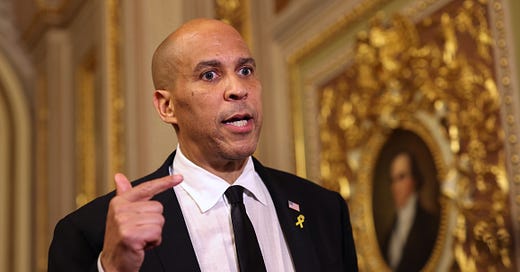
The Future of the Federal Judiciary Is on the Ballot This November, Too
So what are the Biden-appointed judges up to?
WHAT A DIFFERENCE a judge makes.
The progressive advocacy group People For the American Way recently highlighted sixteen legal cases, all from just last month, to show the importance of rulings being issued by President Joe Biden’s picks for the federal judiciary. They addressed issues ranging from immigration law to gun safety to workers’ rights.
PFAW, founded by the late television producer Norman Lear, has long kept a close eye on the federal judiciary, tracking what it considers the courts’ rightward lurch resulting from former President Donald Trump’s judicial picks and their center-left movement under Biden. By the PFAW’s tally, the Senate had confirmed 190 of Biden’s picks for federal district and appellate courts as of April 3; at the same point in his administration, Trump had succeeded in appointing 193 judges. (By the end of Trump’s four-year term, he’d had 234 judges confirmed, including his three Supreme Court justices.)
“The Trump administration prioritized getting MAGA judges confirmed, pushing far too many of our federal court benches to the right,” PFAW declares on its website.
We need to confirm Biden judges who will make our justice system work for all of us, not just the wealthy and powerful. But the Senate is falling behind on confirming these judges. It’s not keeping up with the pace of judicial confirmations under Trump and Mitch McConnell. That’s dangerous, and we need the Senate to pick up the pace and confirm Biden judges now so we can rebalance our courts.
PFAW is, of course, a left-leaning activist organization. But the problem they are flagging is real. Trump’s tenure as our 45th president was hobbled by scandal and incompetence, but one area where he experienced great success was in reshaping the ideological makeup of the federal court system. Now it’s no stretch to say that restoring some amount of balance is crucial to the integrity of our judiciary.
PFAW is now seeking to build support for eight judges who are awaiting Senate floor votes, having otherwise advanced through the confirmation process. According to the group’s spokesperson, Laurie Kinney, there are also six Biden nominees awaiting a hearing, nine awaiting a committee vote, and fifteen awaiting committee action. All told, then, there are thirty-eight Biden judicial picks in the procedural pipeline. Their confirmations would put Biden just shy of Trump’s total. A few more after that would help him exceed it. (Kinney says there remain more than fifty further vacancies without nominees.)
HOW IMPORTANT IS IT for this to happen? Consider the rulings that PFAW identified from March. In those cases, Biden-appointed judges:
Cast the deciding votes to block Texas from enforcing a state immigration law that allows it to arrest and deport immigrants, in contravention of federal law (U.S. v. Texas, two rulings, here and here). Judge Irma Ramirez of the Fifth Circuit Court of Appeals sided with a conservative fellow judge and against a Trump-appointed one in issuing this ruling hours after the U.S. Supreme Court gave Texas the go-ahead to begin enforcing the law. The panel heard oral argument last week on whether to continue the injunction.
Overruled a Trump-appointed judge who had denied a New York prison inmate the ability to sue for alleged retaliation without first paying filing fees and costs (Cotton v. Noeth). Judge Alison Nathan of the Second Circuit Court of Appeals cast the deciding vote to allow the inmate’s action to go forward, a ruling that PFAW says “will help indigent prisoners in the future.”
Upheld a federal law allowing judges to forbid people arrested for federal crimes from possessing firearms as a condition of their release from pretrial detention (U.S. v. Perez-Garcia). Writing for a unanimous three-judge panel, Judge Gabriel Sanchez of the Ninth Circuit Court of Appeals said the restrictions were “consistent with our nation’s historical tradition of firearm regulation.”
Rejected a motion to dismiss lawsuits against a large bank and an investment company by victims of cryptocurrency scandals (Bhatia v. Silvergate Bank). PFAW writes that the ruling by Judge Ruth Montenegro of the Southern District of California “sets an important precedent concerning the ability of fraud victims to seek damages from banks and similar institutions that help carry out the [cryptocurrency] fraud.”
Tossed a lawsuit that a gun-rights group had brought to challenge a recently enacted Washington state law requiring firearms manufacturers and sellers to implement “reasonable controls” on their business. These controls include not marketing to minors or promoting the conversion of firearms into illegal machine guns (National Shooting Sports Foundation Inc. v. Ferguson). Judge Mary Dimke of the Eastern District of Washington ruled that the group had failed to demonstrate sufficient injury to its members.
Sustained the ruling of a lower court that dismissed an advocacy group’s lawsuit against the pharmaceutical company Pfizer for having a program to increase racial and other diversity (Do No Harm v. Pfizer Inc.). Judge Beth Robinson of the Second Circuit Court of Appeals seconded the opinion of a district court judge, Jennifer Rochon—another Biden appointee—that the group lacked standing.
Wrote a decision that overturned a lower court’s ruling barring a woman from suing her employer over alleged sex-based discrimination and a hostile work environment (King v. Aramark Services Inc.). Judge Robinson of the Second Circuit gave the woman a chance to prove her claims in court.
Authored a 2–1 appellate court decision allowing a disabled man to challenge a denial of Social Security benefits, overturning an administrative law judge and a lower court (Conway v. O’Malley). Judge Jennifer Sung of the Ninth Circuit Court of Appeals concluded that there are simply not enough jobs within the man’s ability range. As PFAW notes, she set a circuit-wide precedent “concerning proof of whether a disability applicant can perform work.”
Reversed a lower court ruling that denied a black landowner the chance to seek damages from the United States Postal Service over its refusal to deliver mail to her address; the claimant argues that USPS did this because two of its employees did not “like the idea that a black person” owned the properties (Konan v. USPS). Judge Dana Douglas of the Fifth Circuit Court of Appeals wrote the opinion for a unanimous three-judge panel, which overturned the ruling of a Trump-appointed district court judge.
These nine examples give a sense of the range and importance of rulings issued by judges appointed by the current president in the course of a single month. The point is neither that all Biden judges are excellent nor that all the cases they handle are monumentally significant. The point, rather, is that the judiciary is often the last line of defense that ordinary people have against the power of corporations and the state.
Who is on the bench matters in a major way for the life of our nation. Republicans know this—which is why the Federalist Society and the broader decades-long conservative legal movement exist, and why Mitch McConnell has long been focused above all else on remaking the judiciary. When Americans go to the polls this November, they should remember that they’re voting not just for a president but for the direction the federal judiciary will take long into the future.

















